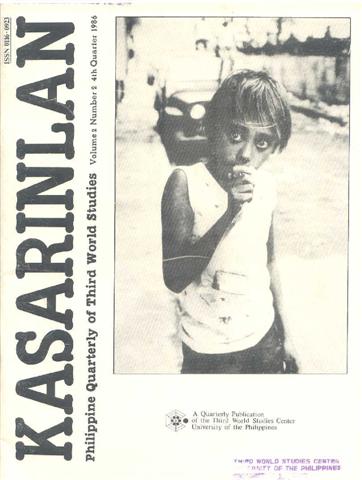Class Formation and Filipino Nationalism: 1950-1970
Abstract
Post-war economic transformation began in 1949, which saw the Philippine government putting restrictions on importation in response to the critical deterioration of balance of payments. The development which followed the import controls caused structural change in the economy shifting significant resources and incomes from the export sector to the industrial sector. This shift re-defined social class structure and produced an industrial entrepreneurial class and promoted the expansion of the urban middle class and working class, consequently diversifying the social background of the elites. As industrialization proceeded, nationalism shifted from the political to economic, calling for more control of the country’s resources by its own people. Claro M. Recto, along with other bourgeois nationalists, believed that economic nationalism was the panacea for the social and economic problems. Economic issues became the agenda of the nationalist debate in the late 1950s until the 1960s creating a split, between the competing segments of the upper class – the primary exporter, the sugar industry and the manufactures. To address the situation, Magsaysay came up with a compromise and promoted both groups’ interests during the ecomonic policy formulation in his administration. However, the Macapagal policy of encouraging foreign investment and decontrol, which was continued by Marcos, led to bankruptcy of manufacturing enterprises as they faced stiff competetion, mainly from US, which had more superior financing resources. And by declaring martial law, Marcos might have protected the foreign and interests conservative forces against the formation of a more diversified society that sought to radically redistribute resources and power.
Published
2007-11-24
How to Cite
DORONILA, Amando.
Class Formation and Filipino Nationalism: 1950-1970.
Kasarinlan: Philippine Journal of Third World Studies, [S.l.], v. 2, n. 2, p. 39-52, nov. 2007.
ISSN 2012-080X.
Available at: <https://journals.upd.edu.ph/index.php/kasarinlan/article/view/552>. Date accessed: 19 sep. 2025.
Issue
Section
Features
Keywords
economic nationalism; class formation; nationalist debate; industrialization; economic policy; import controls
By submitting a manuscript, the authors agree that the exclusive rights to reproduce and distribute the article have been given to the Third World Studies Center.



